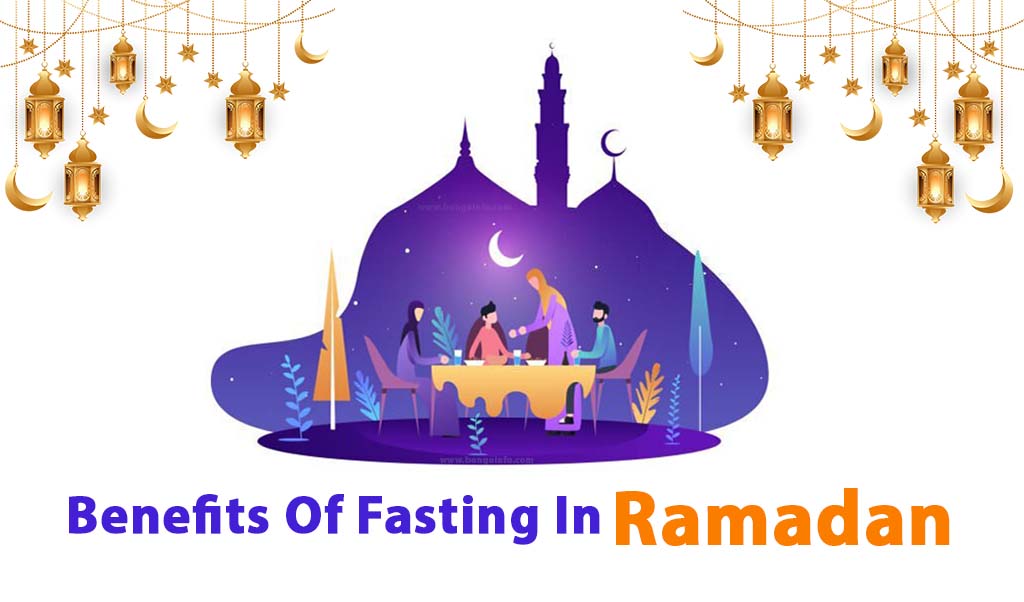Benefits Of Fasting In Ramadan
During the holy month of Ramadan, millions of individuals worldwide observe a daily fast from sunrise to sunset. But did you know that besides it’s spiritual significance, fasting in Ramadan also offers a range of health benefits? Not only does it require incredible self-control to abstain from food & water for around 12-14 hours a day, but Muslim health professionals suggest that this ritual also has significant physiological, psychological and scientific advantages. Ramadan fasting offers a unique opportunity for individuals to empathize with the less fortunate. By experiencing hunger & thirst, people can gain a deeper understanding of the struggles faced by those who do not have access to basic necessities.

What is Ramadan?
Ramadan is the ninth month of the Islamic calendar, during which Muslims around the world fast from sunrise to sunset. It is considered to be the most sacred month of the Islamic calendar, as it marks the time when the Quran was first revealed to Prophet Muhammad. During Ramadan, Muslims abstain from food, drink, smoking and physical relation activity during daylight hours. The fast is broken at sunset with a meal called Iftar and the month is typically marked by increased prayer, charity and community gatherings. Ramadan is an important time for Muslims to reflect on their faith, and seek spiritual renewal.
Abu Hurairah narrated that Prophet Muhammad (PBUH) said:
“Worship Allah and worship none along with Him, offer the (five) prescribed compulsory prayers perfectly, pay the compulsory Zakat and fast the month of Ramadan”.
Benefits of fasting in Ramadan
Fasting during the holy month of Ramadan offers numerous physical, spiritual, psychological & scientific benefits. This practice requires discipline, and self-control, but it can lead to improved mental clarity, weight loss and heart health. By abstaining from food & drink during daylight hours, Muslims can also experience spiritual benefits such as increased focus on prayer, meditation and self-reflection. Additionally, fasting in Ramadan provides an opportunity to empathize with those who are less fortunate, and to gain a deeper understanding of their struggles. This tradition has been found to reduce the risk of chronic illnesses such as diabetes, and high blood pressure. By embracing Ramadan fasting, individuals can improve their overall well-being & gain a greater appreciation for the blessings in their lives. Overall, fasting during Ramadan is a holistic practice that promotes physical, mental and spiritual health.
Spiritual benefits of Ramadan
Fasting during the holy month of Ramadan offers a multitude of spiritual benefits. This practice is considered to be one of the Five Pillars of Islam & provides an opportunity for Muslims to deepen their connection with God.
During the month of Ramadan, Muslims focus on prayer, meditation and self-reflection, which can be applied to other areas of life as well.
Moreover, the night prayer during Ramadan, called Taraweeh, provides an opportunity for Muslims to connect with their community, and to deepen their understanding of the Quran. Muslims also make an effort to engage in acts of charity during Ramadan, which helps to foster a sense of generosity & compassion.
Taqwa
Taqwa is a term used in Islam to describe a state of consciousness, and awareness of Allah, and the truth. It is a combination of piety and fear of God and is mentioned frequently in the holy book of the Quran. Taqwa is a deep sense of caution & mindfulness that individuals should practice in their daily lives to avoid committing sins, and to lead a righteous life.
Fasting during Ramadan is a powerful way to enhance one’s Taqwa. By abstaining from food & drink during daylight hours, Muslims can focus their attention on their spiritual well-being, and avoid unintentional offenses against Allah. Fasting helps to develop self-discipline, and self-control, which are important qualities for leading a life of Taqwa.
Fetches greater rewards
During the holy month of Ramadan and all able Muslims are obligated to observe fasting. According to Islamic beliefs, fasting during Ramadan is a means of seeking Allah’s blessings and rewards in the afterlife. It’s said that every hour spent fasting brings Muslims closer to their creator. The true essence of fasting lies not in the material rewards but in the spiritual significance it holds.
Leads to paradise and prevents Hellfire
In Islam, fasting during Ramadan is believed to hold a special place of honor in the eyes of Allah. According to Islamic tradition, those who fast during Ramadan will be granted access to paradise through the Ar-Rayyan gate on the Day of Resurrection.
This belief serves as a powerful motivation for many Muslims to increase their voluntary fasts in preparation for Ramadan. Even a single day of fasting is believed to move an individual closer to Jannah, and away from the torments of Hellfire.
Muslim scholars have long extolled the spiritual & physical benefits of fasting, which include increased self-discipline, heightened mindfulness and a greater sense of empathy for those in need. By embracing the practice of fasting, individuals can deepen their spiritual connection with Allah and develop a greater sense of gratitude for the blessings in their lives.
Increase in Immunity
Fasting has incredible benefits for our immune system. By reducing inflammation & oxidative stress, it can decrease the production of pro-inflammatory cytokines, and increase the production of antioxidants, which play a vital role in protecting our body from various illnesses & diseases. According to nutrition experts, fasting can also enhance the intestinal lining, and facilitate cleansing, allowing our body to function more efficiently. It can stimulate autophagy, a process that helps cells eliminate harmful, and damaged components, promoting overall health.
Maintenance of Cholesterol Level
Elevated levels of cholesterol can be a significant risk factor for heart disease. When cholesterol levels exceed the normal range, they can accumulate in the artery walls, leading to atherosclerosis – a condition where arteries narrow & restrict blood flow to the heart muscles. This can ultimately result in the development of heart disease. Fasting has been proven to help lower, and maintain cholesterol levels, reducing the risk of developing heart disease.
By adopting a fasting routine, you can help regulate your cholesterol levels, and protect your heart health. Studies have shown that fasting can reduce the amount of low-density lipoprotein (LDL) cholesterol, commonly known as “bad” cholesterol, in the blood. This decrease in LDL cholesterol can prevent the accumulation of plaque in the arteries, leading to a healthier cardiovascular system.
Boost Your Brain
Fasting has been known to have a positive impact on mental health, and spiritual well-being. However, the cognitive benefits of Ramadan fasting are even more remarkable. A recent study conducted by scientists in the USA has revealed that fasting during Ramadan can enhance mental focus, increase the level of brain-derived neurotrophic factor (BDNF) and stimulate the production of brain cells, leading to improved cognitive function. Ramadan fasting reduces the production of cortisol, a stress hormone that can cause anxiety, and other health issues.
The brain-boosting benefits of Ramadan fasting can significantly improve overall cognitive health & reduce the risk of cognitive decline. By incorporating this practice into your lifestyle, you can experience improved mental focus, reduced stress levels and increased brain cell production.
Improved digestive health
Research has shown that fasting can promote digestive health by allowing the digestive system to take a break, and rejuvenate itself. The extent of the benefits of fasting depends on the duration & timing of the fast. When there is a three-hour gap between meals, the migrating motor complex can finish a complete cycle in which any remaining undigested substances are cleared from the digestive system. Even a short period of fasting can aid digestion. Fasting is a natural way to give the digestive system a break, and help it function better. By taking a break from constant eating, you can give your body the chance to restore its natural digestive rhythms, leading to better health overall.
Weight Loss
Fasting during Ramadan is an effective way to achieve weight loss by reducing calorie intake, and controlling portion sizes. However, it is essential to avoid overeating during non-fasting hours to maintain the benefits achieved. To achieve sustainable weight loss results, it is crucial to maintain healthy eating habits, and engage in regular exercise during the non-fasting period.
Ramadan fasting presents a unique opportunity to reset eating habits, and develop healthier relationships with food. By practicing self-discipline & moderation during fasting hours, individuals can improve their overall health, and well-being while achieving their weight loss goals.
Blood Pressure
Fasting has been proven to have a significant impact on blood pressure. By reducing calorie intake, and limiting salt consumption during the fasting period, individuals can maintain healthier blood pressure levels. Studies have shown that fasting during Ramadan leads to a decrease in both systolic & diastolic blood pressure in hypertensive individuals. Fasting can also reduce the risk of developing high blood pressure, which can lead to serious health complications such as heart disease, and stroke. Fasting promotes weight loss, which is another crucial factor in maintaining healthy blood pressure levels. Incorporating fasting into one’s lifestyle can be a powerful tool in managing blood pressure and, improving overall cardiovascular health.
Kick Bad Habits
Ramadan provides an excellent opportunity to kick bad habits to the curb. When you fast during the day, it is advisable to avoid indulging in vices such as smoking, and sugary foods. Your body adapts to their absence, making it easier to overcome your addiction. The presence of a group during Ramadan makes it more manageable to quit bad habits. UK’s National Health Service even suggests that Ramadan is an ideal time to quit smoking due to the significant impact of fasting on breaking bad habits.
Digestive and immune benefits of Fasting:
Fasting during Ramadan can have a positive impact on gut health and immune system. As stomach acid production decreases during fasting, harmful bacteria are reduced, promoting better digestion. Moreover, fasting for an entire month can trigger the production of new white blood cells, leading to a regeneration of the immune system. This, in turn, strengthens the body’s ability to fight off various bacterial & viral infections. By prioritizing fasting during Ramadan, individuals can improve their overall health and well-being.






